List of GSLV launches
This is a list of launches conducted by the Indian Space Research Organisation (ISRO) using Geosynchronous Satellite Launch Vehicle (GSLV) rockets. This list does not include LVM 3 (formerly known as GSLV Mk III) launches, which can be found here.
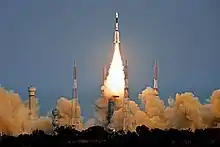
Notable missions
GSLV MK. I flight D1
This was the first developmental flight of the GSLV Mk.I featuring Russian cryogenic engine KVD-1. It was used to place an experimental satellite GSAT-1 into the orbit. However, due to sub-optimal performance and lack of fuel the vehicle did not achieve the intended orbit and the satellite had to maneuver itself using onboard fuel to correct the shortfall. ISRO claims the launch to be successful.[1][2] In a 2014 interview, ISRO Chairman K. Radhakrishnan attributed the failure to incorrect mixture ratio used in the cryogenic upper stage.[3][1][4]
GSLV MK. II flight D5
This was the second test flight with indigenous cryogenic stage CE-7.5 and the first successful launch with the CE-7.5. The flight lifted and successfully placed the 1,982 kilograms (4,370 lb) GSAT-14 into the orbit. This flight became the harbinger of successful launch with the indigenous cryogenic stage.[5][6][7]
GSLV MK. II flight F09
This was the fourth consecutive successful flight of GSLV Mk. II with indigenous cryogenic engine. The flight placed the regional satellite South Asia Satellite was previously named as South Asian Association for Regional Cooperation (SAARC) Satellite.[8][9][10][11] The satellite was a gift from India to its neighbors to bolsters Prime Minister Narendra Modi's neighborhood first policy[12] Afghanistan, Bangladesh, Bhutan, Maldives, Nepal and Sri Lanka are the users of the multi-dimensional facilities provided by the satellite.
Launch statistics
Rocket configurations
- GSLV MK. I
- GSLV MK. II
Launch sites
Mission outcome
- Success
- Partial failure
- Failure
- Planned
Launch history
As of May 29, 2023, rockets from the GSLV family have made 15 launches, resulting in 9 successes, four failures, and two partial failures.[13] All launches have occurred from the Satish Dhawan Space Centre, known before 2002 as the Sriharikota Range (SHAR).
2001–2009 | ||||||||
| Flight No. | Date / time (UTC) | Rocket, Configuration |
Launch site | Payload | Payload mass | Orbit | User | Launch outcome |
|---|---|---|---|---|---|---|---|---|
| D1 | 18 April 2001 10:13 |
Mk I | First | 1540 kg | GTO | INSAT | Partial failure | |
| Developmental flight, payload placed into lower than planned orbit, and did not have sufficient fuel to reach a usable orbit.[1] | ||||||||
| D2 | 8 May 2003 11:28 |
Mk I | First | 1825 kg | GTO | INSAT | Success | |
| Developmental flight.[14] | ||||||||
| F01 | 20 September 2004 10:31 |
Mk I | First | 1950 kg | GTO | INSAT | Success | |
| First operational flight.[15] | ||||||||
| F02 | 10 July 2006 12:08 |
Mk I | Second | 2168 kg | GTO | INSAT | Failure | |
| One of the L40 strap-on engines failed at lift-off. Both rocket and satellite had to be destroyed over the Bay of Bengal after the rocket's trajectory veered outside permitted limits.[16] | ||||||||
| F04 | 2 September 2007 12:51 |
Mk I | Second | 2160 kg | GTO | INSAT | Partial failure | |
| High roll rate build-up due control system malfunction on one L40 strapon resulted in premature shutdown of other strap-on stages.[17] Due to an error in the guidance subsystem achieved orbit had lower apogee and inclination higher than expected.[18] Orbit corrected through satellite, eventually the INSAT-4CR was placed in its slot.[19][20][21] Satellite completed its planned design life while it was fully operational. ISRO claims this GSLV flight to be successful.[22] | ||||||||
2010–2017 | ||||||||
| Flight No. | Date / time (UTC) | Rocket, Configuration |
Launch site | Payload | Payload mass | Orbit | User | Launch outcome |
| D3 | 15 April 2010 10:57 |
Mk II | Second | 2220 kg | GTO | INSAT | Failure | |
| First flight test of the ISRO designed and built Cryogenic Upper Stage (CUS). Failed to reach orbit due to malfunction of the Fuel Booster Turbo Pump (FBTP) of the cryogenic upper stage.[23] | ||||||||
| F06 | 25 December 2010 10:34 |
Mk I | Second | 2310 kg | GTO | INSAT | Failure | |
| First flight of GSLV Mk.I (c). Aft shroud of upper stage engine bay disintegrated due to aerodynamic loads, snapping the electrical continuity to L40 strapons.[24][17] Vehicle was destroyed by range safety officer after loss of control over liquid-fueled boosters.[25] | ||||||||
| D5 | 5 January 2014 10:48 |
Mk II | Second | 1980 kg | GTO | INSAT | Success | |
| The flight was scheduled for 19 August 2013, but one hour and 14 minutes before the lift off, a leakage was reported and the launch was halted.[26] Second flight of GSLV with indigenous cryogenic upper stage (CUS) developed by ISRO's Liquid Propulsion Systems Centre (LPSC) was launched successfully on 5 January 2014.[27][28] It was a launch with precision of 40 m (130 ft). All the three stages performed successfully.[29][30] This was the first successful flight of the cryogenic stage which was developed indigenously in India. | ||||||||
| D6 | 27 August 2015 11:22 |
Mk II | Second | 2117 kg | GTO | INSAT | Success | |
| GSLV Mk II D6 with an Indigenous Cryogenic Engine (ICE) successfully ferried GSAT-6 payload into Geostationary Transfer Orbit (GTO) with injection parameters of 170 km x 35945 km, 19.96° inclination. The cuboid-shaped GSAT-6 satellite includes a technology demonstrator S-Band unfurlable antenna with a diameter of six metre which will provide S-band communication services during its expected mission life of nine years.[31][32][33] | ||||||||
| F05 | 8 September 2016 11:20 |
MK II | Second | 2211 kg | GTO | INSAT | Success | |
| First operational flight of GSLV Mk II. The injection parameters were met with extreme precision. Perigee was within 300m (within 0.18%) of the expected value whereas apogee was within 0.2% (80 km). The difference between expected and actual inclination degree was 0.
INSAT-3DR is an advanced atmospheric weather satellite. as well as the second heaviest satellite placed in orbit by an indigenous cryogenic engine propelled GSLV [34][35][36] | ||||||||
| F09 | 5 May 2017 11:27 |
Mk II | Second | 2230 kg | GTO | INSAT | Success | |
| South Asia Satellite was previously named as South Asian Association for Regional Cooperation (SAARC) Satellite.[37][38][11] | ||||||||
2018 | ||||||||
| Flight No. | Date / time (UTC) | Rocket, Configuration |
Launch site | Payload | Payload mass | Orbit | User | Launch Outcome |
| F08 | 29 March 2018 11:26 |
Mk II | Second | 2140 kg | GTO | INSAT | Success | |
| Used an enhanced version of the Vikas engine called High Thrust Vikas Engine (HTVE) which had a thrust of 848 kN (191,000 lbf) in GS2 stage. Electro-hydraulic Actuation used for gimballing in GS2 stage was replaced by more reliable Electro-Mechanical Actuation.[39][40][41][42][43][44][45] | ||||||||
| F11 | 19 December 2018 10:40 |
Mk II | Second | 2250 kg | GTO | INSAT | Success | |
| Used an enhanced version of the Vikas engine called High Thrust Vikas Engine (HTVE) along with uprated cryogenic engine C15.[46][47][48][49] | ||||||||
2021 | ||||||||
| Flight No. | Date / time (UTC) | Rocket, Configuration |
Launch site | Payload | Payload mass | Orbit | User | Launch Outcome |
| F10 | 12 August 2021 00:13[50][51] |
Mk II | Second | 2268 kg | GTO | ISRO | Failure | |
| Carried EOS-03, a geostationary multi-spectral imaging satellite. The third stage failed to ignite, leading to the loss of the mission. The cause of failure was found to be a 50 millibar drop in pressure in the Liquid Hydrogen tank of the Cryogenic Upper Stage (CUS) [52][53][54][55][56][57][58][59][60] | ||||||||
2023 | ||||||||
| Flight No. | Date / time (UTC) | Rocket, Configuration |
Launch site | Payload | Payload mass | Orbit | User | Launch Outcome |
| F12 | 29 May 2023 10:42[61][62] |
Mk II | Second | 2232 kg | GTO | ISRO | Success | |
| NVS-01 is the first in the second generation navigational satellites. It carried navigational payload operating in L1,L5 and s bands. For the first time, an indigenous atomic clock was flown in NVS-01.[63][64] | ||||||||
Future launches
| Date / time (UTC) | Rocket, Configuration |
Launch site | Payload | Orbit | User |
|---|---|---|---|---|---|
| Net November 2023[65] | Mk II | Second Launch Pad | GTO | ISRO | |
| Follow mission to INSAT-3DR. | |||||
| 2024[66][67][68][69] | Mk II | Second Launch Pad | GTO | ISRO | |
| [70][57] | |||||
| 2024[68][69] | Mk II | Second Launch Pad | GTO | ISRO | |
| [70] | |||||
| March 2024[71] | Mk II | Second Launch Pad | GTO | ISRO | |
| Follow mission to GISAT-1 2268 kg[72][57][73] | |||||
| Oct 2024[74][75][76] | Mk II | Second Launch Pad | SSO | NASA / ISRO | |
| NASA / ISRO collaboration [77] | |||||
| December 2024 [78][79] | Mk II | Second Launch Pad | Venus | ISRO | |
| First Indian Venus mission. | |||||
| TBA [80] | GEV | Second Launch Pad | LEO | ISRO | |
| Orbital Reentry Experiment (ORE) of RLV-TD will use launch vehicle derived from the existing GSLV and PSLV stages to launch Orbital Re-entry vehicle (ORV).[81][82] | |||||
Gallery
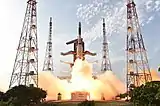 GSLV F05 take off
GSLV F05 take off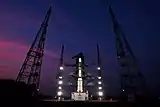 GSLV F11 vehicle at Second Launch Pad.
GSLV F11 vehicle at Second Launch Pad. Fully integrated GSLV-F05 coming out of the Vehicle Assembly Building.
Fully integrated GSLV-F05 coming out of the Vehicle Assembly Building.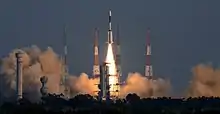 Launch of GSLV F11 from Second Launch Pad.
Launch of GSLV F11 from Second Launch Pad. Top view of a fully Integrated GSLV-F08 inside the Vehicle Assembly Building.
Top view of a fully Integrated GSLV-F08 inside the Vehicle Assembly Building.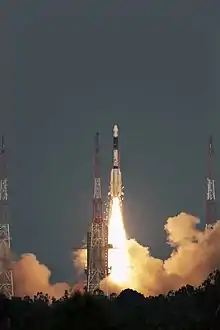 GSLV F08 lift off.
GSLV F08 lift off.
See also
References
- Kyle, Ed (28 December 2010). "Page 2 of 2: Comprehensive Orbital Launch Failure List". India (SLV/ASLV/PSLV/GSLV) Flight History by Variant/Year (1979–2010). Retrieved 14 August 2013.
- "Press Brief on GSLV-D1/GSAT-1". ISRO. 24 April 2001.
- Ramachandran, R. (22 January 2014). "GSLV Mk III, the next milestone". Frontline.
- "ISRO clears launch of GSLV-D5". Business Standard. 31 December 2013. Retrieved 20 January 2014.
- "Isro successfully launches indigenous cryogenic engine-powered GSLV-D5". The Times Of India. Retrieved 5 January 2014.
- "GSLV-D5-Success". ISRO. Archived from the original on 4 January 2014. Retrieved 5 January 2014.
- Subramanian, T.S. (5 January 2014). "GSLV-D5 Launch Success". The Hindu. Chennai, India. Archived from the original on 6 January 2014. Retrieved 5 January 2014.
- "Made in India South Asia Satellite to be launched on 5 May 2017". PTI. 30 April 2017.
- "Official Press Release: GSLV Successfully Launches South Asia Satellite". Press Information Bureau. 5 May 2017.
- Sinha, Amitabh (6 May 2017). "South Asian diplomacy lifts off on 2230-kg ISRO satellite GSAT-9". The Indian Express.
- Clark, Stephen (6 May 2017). "India launches satellite linking its South Asian neighbors". Spaceflight Now.
- "India's SAARC satellite proposal: a boost to a multilateral space agenda". The Space Review. 18 August 2014. Retrieved 22 April 2015.
- "List of GSLV launches". isro.org. ISRO. Archived from the original on 13 August 2021. Retrieved 14 December 2020.
- "GSLV-D2 Mission". ISRO. Archived from the original on 14 March 2009.
- "EDUSAT mission". ISRO. Archived from the original on 18 March 2009.
- "GSLV-F02 Failure Analysis Committee Report". www.spaceref.com. Archived from the original on 24 May 2012. Retrieved 20 August 2021.
- From Fishing Hamlet to Red Planet: India's Space Journey. 15 December 2015. ISBN 9789351776895.
- Clark, Stephen (2 September 2007). "India's large satellite launcher returns to flight". Spaceflight Now.
- "INSAT-4CR successfully placed in orbit". Times of India. 2 September 2007.
- "GSLV-F04 Launch Successful – Places INSAT-4CR in orbit". ISRO. Archived from the original on 1 March 2009.
- "ISRO refutes INSAT-4CR "disappearance" story". Hindustan Times. Archived from the original on 12 November 2013.
- "First manoeuvre to raise satellite's orbit". The Hindu. Sriharikota. Retrieved 19 November 2015.
- "GSLV-D3 Failure Analysis Report". ISRO. Archived from the original on 23 August 2016. Retrieved 14 December 2020.
- "GSLV-F06 Failure-Preliminary findings and Further steps - ISRO". www.isro.gov.in. Retrieved 20 August 2021.
- "Rocket failed after 45 seconds, says ISRO". Hindustan Times. 25 December 2010. Archived from the original on 26 December 2010. Retrieved 25 December 2010.
- "GSLV-D5 rocket launch delayed, countdown clock stopped due to leak in second stage". NDTV. Retrieved 27 November 2013.
- Varma, M. Dinesh (31 October 2013). "Another shot at GSLV with indigenous cryogenic engine". The Hindu. Chennai, India. Retrieved 27 November 2013.
- "Preparations in full swing for December 15 GSLV mission". Hindustan Times. Archived from the original on 6 November 2013. Retrieved 27 November 2013.
- "GSAT-14 Separated". Twitter. 5 January 2014. Retrieved 5 January 2014.
- "Performance of Cryogenic stage of GSLV D5 normal. Ignition sustained". Twitter. 5 January 2014. Retrieved 5 January 2014.
- "ISRO's GSLV D-6 puts GSAT-6 satellite in orbit". The Hindu. 27 August 2015.
- "GSAT 6". Retrieved 1 July 2014.
- "GSAT-6 slated for March launch". The Hindu. 29 October 2014. Retrieved 27 August 2015.
- "ISRO's desi cryo engine–powered GSLV-F05 places INSAT-3DR weather satellite in orbit". Times of India. 8 September 2016. Retrieved 8 September 2016.
- Clark, Stephen. "GSLV puts advanced Indian weather satellite in orbit". Spaceflight Now. Retrieved 8 September 2016.
- "GSLV-F05 lobs advanced weather satellite INSAT-3DR into orbit". The Hindu. 8 September 2016. Retrieved 8 September 2016.
- "Made in India South Asia Satellite to be launched on 5 May 2017". PTI. 30 April 2017.
- Sinha, Amitabh (6 May 2017). "South Asian diplomacy lifts off on 2230-kg ISRO satellite GSAT-9". The Indian Express.
- "GSLV F08-GSAT-6A Brochure". isro.gov.in. Indian Space Research Organisation. Archived from the original on 10 July 2021. Retrieved 29 March 2018.
- "ISRO Loses communication with GSAT-6A". The Economic Times. April 2018. Retrieved 1 April 2018.
- "Status Update of GSAT-6A". isro.gov.in. Archived from the original on 1 April 2018. Retrieved 1 April 2018.
- "ISRO confirms losing contact with communication satellite GSAT-6A". The Times of India. Retrieved 1 April 2018.
- "GSLV Successfully Launches GSAT-6A Satellite". Press Information Bureau. 29 March 2018.
- "29న జిఎస్ఎల్వీ- ఎఫ్08 ప్రయోగం". Prajasakti News. Retrieved 2 March 2018.
- "GSLV-F08/GSAT-6A Mission". ISRO. 18 November 2017. Archived from the original on 18 November 2017. Retrieved 2 April 2018.
- "India's 19 upcoming missions, and ISRO's Small Satellite Launch Vehicle (SSLV)". SpaceTech Asia. 28 August 2018. Retrieved 29 August 2018.
- "Isro lines up 3 rocket launches in two months". The Times of India. Retrieved 7 November 2018.
- "19న నింగిలోకి జీఎస్ఎల్వీ-ఎఫ్ 11 రాకెట్ | Daily Newspaper in Telugu | Telugu News Headlines | Andhrabhoomi". andhrabhoomi.netn. Retrieved 3 December 2018.
- "ISRO's GSLV-F11/Gsat-7A mission successful, satellite meant for military applications placed in orbit". The Times of India. 19 December 2018. Retrieved 19 December 2018.
- "ISRO plans to launch geo imaging satellite on August 12". The Hindu. 10 July 2021. Retrieved 10 July 2021.
- "SDSC-SHAR - Upcoming Missions". Satish Dhawan Space Centre. Retrieved 23 March 2021.
- Indian Space Research Organization [@isro] (12 August 2021). "GSLV-F10 launch took place today at 0543 Hrs IST as scheduled. Performance of first and second stages was normal. However, Cryogenic Upper Stage ignition did not happen due to technical anomaly. The mission couldn't be accomplished as intended" (Tweet) – via Twitter.
- "India's GSLV fails on long-delayed EOS-03 mission". NASASpaceFlight.com. 11 August 2021. Retrieved 12 August 2021.
- "GSLV failure to have an impact on India's human space mission". Business Standard India. 12 August 2021. Retrieved 12 August 2021.
- "GSLV-F10 / GISAT-1". ISRO. Archived from the original on 28 April 2021. Retrieved 25 February 2020.
- "Planned Launches of GSLV" (PDF). VSSC. Retrieved 22 December 2019.
- "Annual Report 2022-2023" (PDF). ISRO. 23 March 2023. Archived from the original (PDF) on 25 March 2023. Retrieved 23 March 2023.
- "SDSC-SHAR Website". www.shar.gov.in. Retrieved 16 July 2021.
- "2021 GSLV mission failed due to loss of pressure in fuel tank:Isro". www.hindustantimes.com. 20 November 2021. Retrieved 20 November 2021.
- "GSLV-F10/EOS-03 Mission Failure: Failure Analysis Committee submits conclusions & recommendations - ISRO". www.isro.gov.in. Retrieved 25 March 2022.
- "ISRO's GSLV-F12 successfully places navigation satellite NVS-01 into intended orbit". The Hindu. 29 May 2023. ISSN 0971-751X. Retrieved 1 June 2023.
- "India's navigation system gets a boost after ISRO successfully launches NVS-01 satellite". Hindustan Times. 30 May 2023. Retrieved 1 June 2023.
- "Isro's GSLV-F12 successfully places navigation satellite NVS-01". The Times of India. 29 May 2023. ISSN 0971-8257. Retrieved 29 May 2023.
- "GSLV-F12/NVS-01 Mission". www.isro.gov.in. Retrieved 29 May 2023.
- "ISRO 'going to have exciting missions' in 2023, says Chairman Somanath". www.livemint.com. 30 July 2023. Retrieved 30 July 2023.
- "ISRO 'going to have exciting missions' in 2023, says Chairman Somanath". www.livemint.com. 30 July 2023. Retrieved 30 July 2023.
- "Gaganyaan: More than 2 uncrewed missions on cards". Retrieved 25 July 2021.
- Kumar, Chethan (12 March 2021). "Isro aims for 7 more launches from India in 2021". The Times of India. Retrieved 29 April 2021.
- Kumar, Chethan (6 April 2022). "2 Gaganyaan abort tests in August, December; relay satellites next year". The Times of India. Retrieved 25 June 2022.
- D.S., Madhumathi (6 January 2020). "New data relay satellites to keep Gaganyaan crew in touch with Earth". The Hindu. Retrieved 6 January 2020.
- "ISRO Report on Highlights and Issues in Datasets and Products". ISRO. 26 April 2023. Retrieved 19 May 2023.
- D.S., Madhumathi (2 April 2019). "Starting May, ISRO to launch a string of "defence" satellites". The Hindu. Retrieved 2 April 2019.
- Krebs, Gunter (10 April 2021). "GISAT 1, 2 (EOS 03, 05)". Gunter's Space Page. Retrieved 29 April 2021.
- Rosen, Paul; Owen, Susan; Chapman, Bruce (1 September 2022). NASA-ISRO SAR (NISAR) Mission: Countdown to NISAR (PDF). 2022 NISAR Community Science Workshop. Pasadena, CA: NASA. pp. 8–13. Retrieved 16 October 2022.
- Desai, Nilesh M. (15–17 June 2022). Joint ISRO-IMD Report on updates and Future Plans. CGMS-50. ISRO. p. 8. Retrieved 25 June 2022.
- "GAO-23-106021, NASA: Assessment of Major Projects" (PDF).
The project had to rebaseline and is now working toward a launch date of October 2024, an approximately 2-year delay from its original baseline
- Krebs, Gunter. "NISAR". Gunter's Space Page. Retrieved 27 April 2017.
- Mehta, Jatan (19 November 2020). "India's Shukrayaan orbiter to study Venus for over four years, launches in 2024". SpaceNews. Retrieved 20 November 2020.
- Mukunth, Vasudevan (16 January 2023). "ISRO pushing Venus mission 'Shukrayaan' to 2031?". The Hindu. ISSN 0971-751X. Retrieved 3 April 2023.
- "Annual Report, Department of Space 2020-2021" (PDF). 4 March 2021. Archived from the original (PDF) on 4 March 2021.
GEV for Orbital Re-entry Experiment (ORE): Launch with 1:8 scale RLV, targeted in first quarter of 2022.
- "Reusable Launch Vehicle". www.vssc.gov.in. Retrieved 2 April 2023.
- "75 Major Activities of ISRO" (PDF). Archived from the original (PDF) on 18 February 2022.
